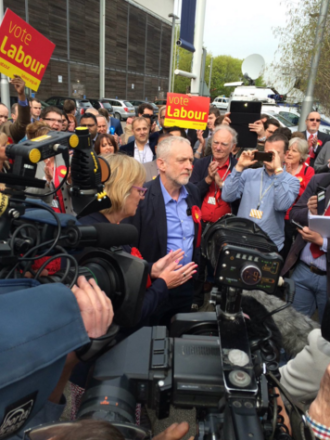
Repeating “you’re wrong” has never been a good way to win an argument. Yesterday anti-Corbyn Labour MPs were reminded of that. In a poll for The Times, 64 per cent of those eligible said they would vote for Jeremy Corbyn if there was another leadership contest: among Labour members, his popularity is only increasing. The dysfunctional relationship between MPs brimming with acerbic criticism of their leader and members who are unceasingly loyal to him isn’t getting better. And it’s only doing Labour damage. It doesn’t have to be this way: the party can find a way to work together.
It’s not uncommon to hear Corbyn sceptics dismiss the vast majority of his supporters as naïve and living in a fantasyland or repeat “he’s unelectable” ad nauseum. But he’s the democratically elected leader of the party and his support is rising. You have to wonder: what are they hoping to achieve? If Corbyn supporters are living in another world, so too are these Labour critics: they’re at odds with the Labour members that elected the leader they’re so desperate to dethrone and unable to agree on, or put forward, a viable candidate to replace him. Equally they’re entirely uninterested in how Corbyn secured a landslide victory to begin with.
This often comes down to electability: anti-Corbyn brigade is adamant only they have the key to winning. In their defence, perhaps that’s because more people polled by The Times are happy with his leadership than think he’s in with a chance of becoming Prime Minister in 2020. But as I’ve written before, electability isn’t the preserve of the right. Tony Blair might have won three elections – the first on a huge landslide – but this isn’t 1997; times have changed.
Having said that, the blame can’t simply be laid at the door of a small group of unhappy, vocal MPs. A Corbyn-led Labour needs to develop a strategy to win in 2020. The chasm between members who think Corbyn is doing a “good job” (72 per cent) and those who think he’s “competent” (45 per cent) has to be bridged. That means there’s work to be done: a clear narrative that goes beyond fuzzy words like anti-austerity and a slicker media operation are good places to start. Similarly, supporters who are quick to denounce unhelpfully sceptical Labour MPs should focus their energy on campaigning instead.
So here’s a message to all sides of this spat: hurling abuse at your opponents while ignoring your own shortcomings won’t get you very far at all. Everyone has to face up to reality. That means the Labour Party has to find a way to unite with Corbyn as leader because he isn’t going anywhere anytime soon. And they need to do under with a strong strategy. There’s proof it’s possible: the EU referendum, the Government’s plan to cuts to tax credits and vital disability benefits (personal independence payments or PIPs) are all areas where the majority of the PLP are marching, or marched, to the beat of the same drum.
Everyone will have to make some concessions. They could take their lead from Corbyn who decided to wholeheartedly support the EU “In” campaign, having previously been a Eurosceptic; or supposed “moderate” Liam Byrne, who called time on neo-liberalism last November. There will, of course, be significant points where it’s simply impossible to reach an agreement. But that doesn’t mean there’s any need to descend into the mudslinging we’ve seen in recent months, the kind of which wouldn’t be tolerated in any other workplace.
Most people don’t care about internal Labour Party politics; about who’s a Blairite, Brownite, Corbynite or a “moderate”. They do care if they see a party divided and that’s where we’re at now. Labour has reached an impasse; it’s time for the leadership to develop a strong domestic narrative for 2020 and for others to give up their open hostility to Corbyn. Perhaps that way Labour can try to find a way to work together.




More from LabourList
Antonia Romeo appointed to lead civil service as new Cabinet Secretary
‘If Labour is serious about upskilling Britain, it must mobilise local businesses’
Stella Tsantekidou column: ‘What are we to make of the Labour Together scandal?’